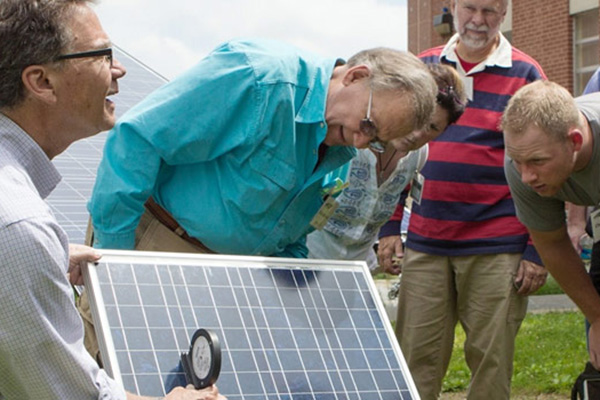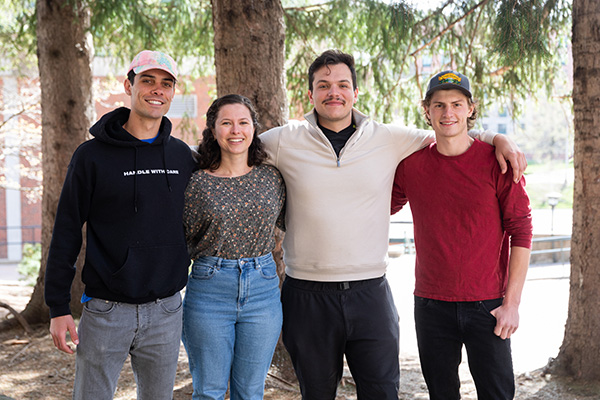BOONE, N.C. — Three App State graduate students won a $25,000 prize for their sustainable business pitch at the second annual EnergyTech University Prize (UP) competition during the spring 2023 semester.
Sponsored by the U.S. Department of Energy’s (DOE) Office of Technology Transitions, the event has teams identify a promising energy technology, assess its market potential and pitch a strategy for commercialization of the product to a panel of judges.
Team BioCharm, made up of Clayton Pope ’21, from Cary, Robert Conolly ’22, from Raleigh, and Daniel Rose ’22, from Silver City, New Mexico — all graduate students in App State’s Department of Sustainable Technology and the Built Environment — presented a plan for their BioCharm Supply and Consulting business in the competition’s fossil energy and carbon management category. The goal of the conceptual business is to lease on-site property and leverage food and wood waste at public landfills to produce biochar, which can be used as a supplement for cement in construction projects.
During the team’s presentation, Connolly said, “The cement production industry contributes heavily to national and international carbon footprints, making up a total of 8% of global CO2 (carbon dioxide) emissions. In order to reduce this massive footprint, it is imperative that new technology be introduced to the construction sector. BioCharm is introducing a groundbreaking process to significantly reduce carbon emissions.”
DOE provides winning teams with resources to move forward and further develop their proposals, if they choose. While Team Biocharm is not pursuing its plan at this time, Pope said that he and Rose have discussed the possibility of developing a business in the future.
The competition
Nearly 200 student teams representing 124 schools across the nation participated in the EnergyTech UP competition. In addition to regional prizes, several DOE Technology Offices offer $25,000 bonus prizes for the best teams in their respective fields, with the money going directly to the students. Team BioCharm’s pitch was selected as the crowd favorite in the fossil energy and carbon management category.
“The BioCharm team put together a very thorough and professional presentation,” said Dr. Jeremy Ferrell, associate professor and assistant chair in App State’s Department of Sustainable Technology and the Built Environment. “App State continues to be well represented on the clean tech national stage thanks to these talented and passionate students.”
App State had similar success at the inaugural event last year, with Appalachian Biochar (now Team BioCharm) placing as a bonus prize semifinalist, and a second App State team, Solar Shepherds, taking home national and regional prizes as well.
“This was a huge learning experience for all students who took part, and we are all very proud to continue App State’s legacy in this competition,” said Rose.
The pitch
According to Team BioCharm’s pitch, wood and food waste collectively accounted for 29.9% of all materials at municipal solid waste landfills in the U.S. in 2018. Once this biomass is converted to biochar through pyrolysis (the heating of an organic material in the absence of oxygen), the biochar can be ground into a fine powder to be used as a supplementary cementitious material (SCM) in concrete. This would reduce the carbon footprint of concrete by 45.5%, the team said.
The team explained that the product would primarily be used in public and commercial construction for green building certified design and building projects, and the plan is to launch startups in Florida, Georgia and California — three states with high amounts of wood waste and high numbers of new building permits.
As for profits, Pope said BioCharm has two main revenue streams.
“First, we supply subcontractors with the necessary amount of biochar to support their projects,” he said. “Second, sequestering carbon dioxide through the production of biochar allows us to generate and sell carbon credits in voluntary carbon markets in the U.S.” A voluntary carbon market gives companies that are unable to reach their carbon emission targets the opportunity to invest in environmental projects that can reduce or remove carbon emissions from the atmosphere.
Pope added that the national market for SCMs was evaluated at $3.5 billion in 2020 and is projected to reach $6.8 billion by 2030. “Similarly, the growth of voluntary carbon markets in the U.S. is expected to increase exponentially over the next 10 years,” he said.
Rose said biochar is sold at $350 per ton, with each carbon credit being valued at $25 per ton.
“With higher rates of CO2 reduction, and a lower rate of replacement, this is cost competitive,” he said. “Once the equipment is paid off in a little over two years, each location will bring in an estimated profit of $547,000 per year, allowing us to provide enough capital at five years of operation to begin expanding to other locations.”
What do you think?
Share your feedback on this story.
About the Department of Sustainable Technology and the Built Environment
One of seven departments housed in the College of Fine and Applied Arts, the Department of Sustainable Technology and the Built Environment at Appalachian State University features an integrated array of programs spanning the fields of sustainable design and technology. Its mission is to foster a strong and vibrant culture of inquiry, discovery and innovation that integrates theory with application, problem seeking with problem-solving, local issues with global perspectives and technological progress with environmental stewardship. It offers bachelor’s degrees in sustainable technology and building science, and a master’s degree in technology. Learn more at https://stbe.appstate.edu.
About the College of Fine and Applied Arts
Appalachian State University’s College of Fine and Applied Arts is a dynamic and innovative group of seven academic departments, bringing together a variety of perspectives, experiences and real-world education to provide unique opportunities for student success. The college has more than 3,500 undergraduate and graduate majors. Its departments are Applied Design, Art, Communication, Military Science and Leadership, Sustainable Development, Sustainable Technology and the Built Environment, and Theatre and Dance. Learn more at https://cfaa.appstate.edu.
About Appalachian State University
As a premier public institution, Appalachian State University prepares students to lead purposeful lives. App State is one of 17 campuses in the University of North Carolina System, with a national reputation for innovative teaching and opening access to a high-quality, cost-effective education. The university enrolls more than 21,000 students, has a low student-to-faculty ratio and offers more than 150 undergraduate and 80 graduate majors at its Boone and Hickory campuses and through App State Online. Learn more at https://www.appstate.edu.














